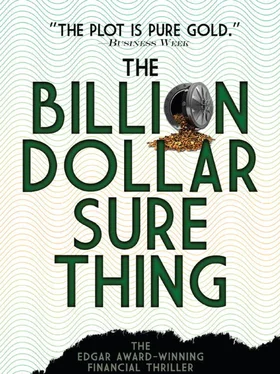“If he has always worked with the Basel branch, why are you all of a sudden handling his business?”
“Yesterday he came up with this very large operation. It’s too big for any of our branches, including Basel. So Widmer sent him directly to me. He, of course, operates exclusively with numbered accounts. His instructions are quite simple. He wants to buy gold bullion at the market for just a shade under $200 million. He put up $100 million in cash. Then he wants to use the gold as collateral for a very substantial short sale of U.S. dollars against the Swiss franc. From our standpoint it makes good sense. We will make at least $1 million in commissions on what is essentially a very simple operation. Our exposure is nil. Of course, there is risk from his standpoint.”
“He realizes this?”
“No doubt. He has one of the fastest minds I’ve ever seen among our private clients. Obviously a very professional money manager. I feel that I can completely assure you, Dr. Hofer, that he will not turn into a crybaby and pester us to death if the operation goes wrong. He’s not a troublemaker. So also from that standpoint, our exposure is essentially nil.”
“I still don’t like it,” stated Hofer. “At all. Has he come with good funds?”
“Yes, sir. He had the entire $100 million delivered in T-bills a few days ago in New York. The people at our branch there checked out their validity. No problem. They are authentic, not stolen. In fact, they were sold yesterday, and the proceeds have already arrived here. So he’s working from cash.”
“No idea where the Treasury bills originated?”
“No, sir. They’re bearer instruments, you know. No way of really checking back. But still, there is something. He opened up an entirely new numbered account for these transactions. He maintains about twenty accounts in all with us—in Basel, except for this one. There is a co-signature on all the new account papers. A certain Ali ben Fezali of Beirut.”
“The same one we work with in the currency business?”
“Right. We get shipments of assorted bank notes, and I do mean assorted, about every other week. We buy them from him at rather special rates, and then clear the notes, or most of them, back to the country of origin. He usually employs the proceeds for the purchase of gold and silver coinage. I would guess that we make large return shipments to him at least once a month. He maintains excellent sight balances with us, and has for many years. All in all, he’s one of our better clients in Lebanon.”
“Did he show up with Rosen yesterday?”
“No, sir. Apparently Rosen had all the account papers made out and signed a week or so ago. He had a habit of keeping a few sets with him. As I said, he maintains about twenty accounts with us and keeps opening up more all the time. So that’s hardly unusual. Of course we’ve got countless specimens of Fezali’s signature, and everything checks out there also.”
“Isn’t Rosen a Jew?” asked Hofer.
“I assume so,” replied Kellermann. “But I would not attach too much importance to that element. After all, we have seen a lot of stranger combinations around here.”
“Has Rosen ever done anything like this before?”
“No. He’s never touched either gold or currency futures. Actually, Widmer over at our Basel branch told me that this operation is completely out of his usual line. Apparently Rosen’s a type who plays things very carefully, never plunges, takes profits early, never tries to squeeze out the last drop. A rather ideal type of client. He never blames us for giving him bad advice, like so many of our other American customers. He relies completely upon himself and his own ideas. He’s often not too happy about the delays and errors in our accounting. But that’s not new. All Americans are very fussy in that regard.”
“The more I hear, the less I like it,” said Hofer. “Look, I don’t want our bank to be dragged into something that could bring us up against the American authorities. You know it’s illegal for an American national to deal in gold bullion. Sure they overlook all the little fishes, but a couple of years ago they tried to get at Bernie Cornfeld and IOS for an alleged gold purchase they made way back in 1968—a big one. This could mean big trouble, and that could bring big publicity, especially in those damned American newspapers. One Helga Hughes affair was enough for Zurich in this decade. And I have a funny feeling that there’s something wrong here. Kellermann, you tell our people in New York to get everything available on this man. Right away. And stall Rosen in the meantime. I want a reply on my desk no later than eight tomorrow morning. The fellows in New York have almost all of a working day left to get what we need.”
Kellermann frowned. This was not normal, and Kellermann did not like abnormal things. He lived a very orderly life. He prided himself that once his word was given, that was it. And he had given it to Rosen. As far as he was concerned, the bank was committed to carry out Rosen’s instructions, as received.
“Dr. Hofer, I’m afraid that it’s a bit too late to change things very much. I have accepted his order to buy the gold and to start building up his short position in dollars.”
“Verbally?”
“Of course. But he will expect to be able to go through the confirmations of these transactions from his dossier before the week is out. He’s staying in Zurich for that express purpose. As far as I know, Zimmerer’s men must have already arranged to accumulate part of that gold in this afternoon’s fixing session, and no doubt they are also selling dollars as instructed.”
Hofer thought this over.
“Kellermann, what’s done is done. That’s clear. But now I want you to do something. Immediately. Get hold of Rosen and tell him that we cannot proceed further with his orders unless we get 50 percent more cash margin. If that doesn’t stop him, it will at least slow him down quite a bit. Very few people can raise $50 million in cash quickly.”
“Yes, sir.”
“Now tell me, Kellermann, have any of your other big clients started to move in the same direction?”
“Nothing on the order of Rosen, but things have greatly heated up during the past few hours. Everybody was expecting an unusually large sale of Russian gold this week through the Bank for International Settlements. But nothing happened. Apparently they withdrew it at the last moment, without any logical explanation. Reuters had a speculative type of story on the wire just before I came up here. Apparently they got to somebody at the Zurich airport who claimed that the gold was actually shipped in last week but is just sitting there in the bonded warehouse out at Kloten. A thing like that alone could produce a lot more action today, especially in a market which is already on the move. One thing is for sure; these days the speculators do not lack either money or crazy ideas.”
“Kellermann, keep in touch with the gold department and the foreign exchange people. If anything really unusual develops this afternoon, I want you to stay personally on top of it. Something’s going on.” Kellermann knew when he was dismissed. Hofer simply no longer recognized his presence. This often proved highly offensive for executives new at the Hofer game. But Kellermann had gotten used to it long ago. He closed the double doors protecting Hofer’s office from any possible audible intrusion from the outside world, and walked down the corridor to the bank of elevators. He was perturbed. He did not like Hofer interfering with his clientele. Especially after he was already committed. More than just Hofer was involved here. It was the integrity of the bank, and of himself. His instructions were clear. If Rosen could produce the additional cash margin, as far as he, Kellermann, was concerned, the deal was on. If not, it was strictly Hofer’s responsibility, and he would have to explain it to Rosen. On that, he would insist.
Читать дальше












